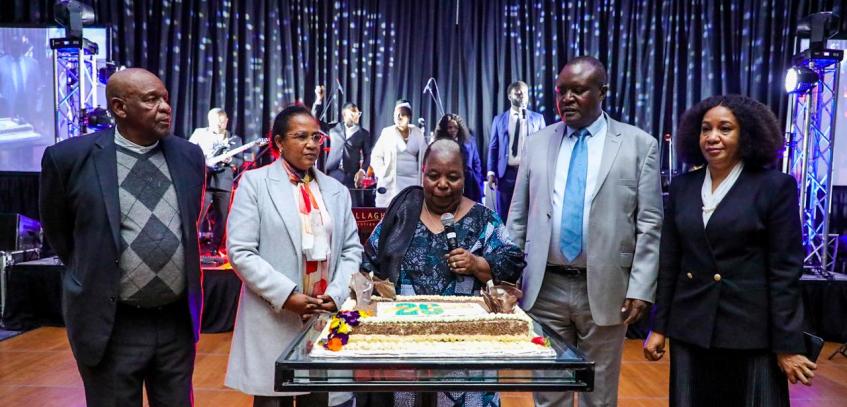The Gallagher Convention Centre in Midrand, South Africa, the headquarters of the Pan-African Parliament, was the scene of vibrant celebrations on Monday, marking the 20th anniversary of the Pan-African Parliament. The Parliament was first inaugurated on 18 March 2004, in Addis Ababa, Ethiopia.
Held under the theme “Two Decades of the Pan-African Parliament: Reflecting on the Future and Charting a Path Forward,” the event brought together parliamentarians, representatives of African Union (AU) organs, the African Diplomatic Corps accredited to South Africa, and civil society organizations. The celebrations provided an opportunity to outline a vision for the future of the Pan-African Parliament, identify key areas for improvement and expansion, and emphasise the Parliament's role in the African Union's Agenda 2063 and other regional development initiatives.
Over the past two decades, the Pan-African Parliament has been at the heart of efforts to amplify the voices of African citizens and facilitate the implementation of policies and treaties aimed at fostering development and cooperation among member states. The PAP has seen many successes, including the advancement of women's rights, the endorsement of democratic norms, and the promotion of peace and security across the continent.
Gracing the event as the Guest of Honour, the inaugural President H.E. Gertrude Mongella (2004-2009) urged continued dedication to the Parliament's mission and the full realization of its mandate. Reflecting on its journey, she emphasized the importance of maintaining autonomy and unity to benefit all African citizens.
She posed a critical question to the Parliament: "From where we started, where are we? Are we still singing the same song of one Africa, one voice?" Mongella underscored the Parliament's pivotal role in African affairs, advocating for enhanced autonomy and impactful engagement in continental issues.
In a thought-provoking virtual presentation, Professor Patrick Loch Otieno Lumumba reflected on the journey of Pan-Africanism and emphasized the importance of understanding it within a historical context.
He stressed the need to contextualize the history of the Pan-African Parliament, warning against oversimplifying its origins by solely attributing it to the Abuja Treaty. “We must ask ourselves, why were we [Parliament] established? What were the things that we were designed to achieve?” he enquired.
In a show of solidarity and partnership, the Pan-African Parliament received resounding support from key partners and institutions driving Africa's integration and development.
“Reflecting on the two-decade journey of the Pan-African Parliament, we commend its unwavering dedication to serving the African people," stated H.E. Wamkele Mene, Secretary-General of the African Continental Free Trade Area (AfCFTA). "As a pivotal voice for Africa, the PAP plays a crucial role in fostering unity, peace, and prosperity across our continent.”
Mr. William Carew, Head of Secretariat at the African Union Economic, Social and Cultural Council (ECOSOCC), reflected on the shared journey and vision of both ECOSOCC and the Pan-African Parliament, recognising their fundamental roles as citizen representation organs within the AU. He expressed optimism for strengthened collaboration in the years ahead, aiming to enhance synergies and advance shared priorities.
H.E. Amb. Andre Nzapayeke, Dean of the African Diplomatic Corps in South Africa underscored the Pan-African Parliament's pivotal role as a beacon of unity and integration among African nations. He highlighted the occasion as an opportunity to reiterate commitments to supporting the institution's mandate and raising awareness of its achievements and challenges.
In 2021, 18 March was officially launched as the Pan-African Parliament Day, also known as the PAP Day. This commemorative occasion serves as a reminder for decision-makers across the continent to honor their commitment to the PAP by ratifying the Protocol to the Constitutive Act of the AU relating to the PAP, commonly known as the Malabo Protocol. The upcoming PAP Day holds special significance as it coincides with the 20th anniversary of the institution.








